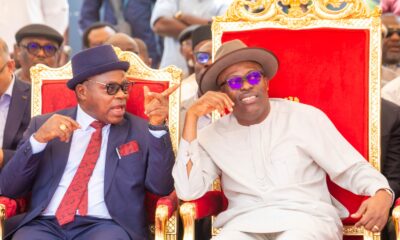Business
Lagos-Abidjan Expressway Project Begins 2014 –Jonathan
President Goodluck Jonathan said last Saturday in Abidjan, Cote d’Ivoire that the construction of Lagos to Abidjan Expressway would commence next year.
The president made the disclosure at the Nigerian-Cote d’Ivoire Investors Forum on the sideline of his state visit to that country.
He said that the construction of the road was imperative to enhance free movement of goods and persons and reduce the encumbrances currently posed by the local customs and police to business men.
He said that the construction of the road was “dear to the heart of the ECOWAS leaders”.
Jonathan was speaking on the sideline of the 42nd ECOWAS Summit in Yammoussoukro, there was a meeting of the leaders of Nigeria, Togo, Benin, Cote d’Ivoire and Ghana on how to actualise the project.
“We have charged the Ivorian Minister of Infrastructure and the Nigerian Minister of Works to work with the ECOWAS Commission that within two weeks they must come up with a blueprint and preliminary information on the project.
“We will discuss the issue in Addis Ababa in May when we go for AU meeting.
“This is because we want a situation where the desk-work will be completed this year and by next year, we want physical construction.
“We believe that when we have this express road the issue of movement, interference by Customs and Police will be minimised because that will be an ECOWAS road.
“The laws regulating the use of the road will not be the laws regulating that of the roads in Nigeria, Cote d’Ivoire or Ghana.
“It will be an international standard and everything will be done in such a way that movement of goods, services and so on will not be interfered with by local restriction.”
Jonathan said that the projects would not be financed with public funds but by development partners and some viable banks which would re-coup their funds through tariffs and toll fees.
“It is a viable project that banks and business men within and outside the region will key into and which will generate enough money in short time.
Jonathan further explained that the project when completed would integrate the entire region.
“Togo has seven million, Benin Republic, eight million, Cote d’Ivoire, 25 million, Ghana 26 million and Nigeria about 167 million.
“When you add all these together, it gives you about 236 million out of the projected 287 million of ECOWAS.
“So, these five countries, by the time you traverse from Nigeria to Cote d’Ivoire, then you will easily integrate the entire sub-region.
“You will so integrate the system in such a way that you can key other countries along, that is why we decided that we must work with our business men and women to develop an express road from Lagos to Abidjan,” he said.
The president noted that there were lots of investment opportunities in the sub-region which were yet to be harnessed for development.
He identified the major challenges to development as lack of technology and exportation of raw materials without adding values.
“When you export crude oil you export job opportunities because those who refine the crude oil and turn our gas to petrochemical create a lot of jobs.
“Like now, we are supposed to be exporting finished products not crude oil and gas but we are still doing that.
“Cote d’Ivoire is just going to the oil industry, they should not make the mistakes Nigeria made from the beginning they must think about exporting finished products not exporting crude oil.
Jonathan noted that economic growth should not be reduced to paper work but realities that would affect the lives of the citizens.
Business
Abolish Multiple Taxation In Rivers, Group Urges Govt
Business
MDAs, Presidency Spend N1.9bn On Trips, Trainings In France
Business
NCDMB, ARPHL, Others Partner On Refinery Project
-
Politics14 hours ago
You’re Democratic Accountability Agents, Diri Tells Journalists
-

 Featured17 hours ago
Featured17 hours agoWe’ll Comply With Supreme Court Judgement, Fubara Assures …As CJ Inaugurates Judges’ Quarters
-
Business14 hours ago
Coy Launches $2m Fund For Nigerian Entrepreneurs
-
Sports14 hours ago
RFF Announces 15 Players For African Games
-
News18 hours ago
Lassa Fever: Death Toll Rises To 15 In Edo
-
Opinion14 hours ago
IWD: Accelerating Action To End Women Harassment
-
Niger Delta17 hours ago
Ex-Ogbia Youth Leader Lauds Police, Others Over Kidnap Victims’ Rescue … Condemns Kidnapping
-
Business14 hours ago
Nestle Professional Empowers Women Entrepreneurs

